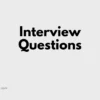People Management Interview Questions Examples
Management Style Questions
One of the most common themes in people management interviews is understanding your management style. You might get asked something like, “How do you describe your leadership approach?” I remember being stumped by this once, like, why does my style matter so much? But then I realized it helps employers see if I’m compatible with their team dynamics. If you have a more hands-on approach, it might click better with a collaborative culture. Think about your past experiences and how you motivate your team.
Motivation and Engagement
Another question can be about strategies to motivate your team. An interviewer might ask, “What techniques have you used to enhance employee engagement?” Reflecting on my journey, I remember one time I introduced a rewards program based on performance metrics. Sounds simple, but you’d be surprised how it sparked a competitive spirit and lifted enthusiasm around the office.
- Recognize achievements publicly.
- Encourage feedback—everyone likes to be heard.
- Facilitate team-building activities.
Conflict Resolution Skills
Handling conflict is another biggie. You might face a prompt like, “Describe a time you resolved a dispute between employees.” This can feel daunting, but trust me, it’s all about showing your approach. I’ve had my share of heated meetings. Once, I brought in the involved parties to discuss openly and laid down ground rules to keep it constructive. We ended up finding common ground and even got a joke or two in there. Who knew conflict resolution could be a bonding experience?
Dealing with Underperformance
Questions on poor performance also pop up like, “What do you do when an employee isn’t meeting expectations?” I’ve always believed in the power of constant communication. One time, I sat down with an underperformer to understand what was blocking them. Turns out, they just needed more training on the new software. Sometimes, it’s just that simple.
Termination Experience & Ethics
Talking about termination is definitely delicate. You might hear, “Can you share your experience with employee termination?” This is serious stuff, reflecting your decision-making and ethics. I’ve only had to do it once, and let me tell you, it was rough. I made sure to follow HR protocols to a T, but it still felt awful. If you approach this situation from a standpoint of professionalism and compassion, it speaks volumes about your character.
Fostering Creativity and Followership
Questions might even throw a twist about inspiring followership: “How do you encourage your team to be creative?” You could share a method you employed that broke the monotony—like organizing brainstorming sessions or innovation challenges. Seriously, putting thumbs together to come up with wild ideas can pump up morale like nobody’s business. Plus, it shows your commitment to a dynamic workplace.
And hey, sometimes they’ll check how you handle dress code violations—like, “How would you address inappropriate workplace attire?” It’s about enforcing policies while maintaining respect and dignity. Here’s a tip: approach it casually and in private. You’ll come off as fair and understanding, and nobody wants to feel called out in front of their peers.
Effective Management Interview Questions
When you’re preparing for a management interview, you really gotta hit on key topics that let your future employer see your leadership style. It’s not just about the basics—trust, communication, and transparency matter a ton. You could think of a time when you fostered trust in your last team. Maybe you hosted regular check-ins where open communication was encouraged. A simple question could be, “How do you typically build trust within your team?” It’s a great opener to show your style.
Then, let’s bring up conflict resolution. It’s like juggling, right? You’ve gotta recognize both sides for effective resolution! You might say, “Can you describe how you handled a conflict between team members?” This lets you share your experiences, something like how you encouraged open dialogue that helped both parties feel heard. Sharing personal stories lends authenticity, and your future employer will appreciate that.
Motivation & Prioritizing
And who could forget about motivation strategies? Keeping team spirits high is no walk in the park. A question like, “What methods do you use to motivate your team?” allows you to dive into your own experiences. Maybe you utilize incentives or recognize achievements in front of the entire team. It’s those little things that really make a difference!
Next up, there’s task prioritization. Picture a moment where you were juggling multiple deadlines. You could answer with something like, “I assess both urgency and importance before juggling tasks.” It shows you value efficient project management skills.
Difficult Conversations and Growth
Don’t shy away from questions about difficult employees either. It’s a part of managing, right? You might say, “What’s your approach when dealing with difficult team members?” Share a specific instance showing how you turned a negative into a positive. That not only demonstrates you have conflict resolution skills but also that you focus on team growth.
Handling Stress & Decision-Making
Managing stress might crop up, so you could prep by reflecting on what you’ve done in the past. Questions like, “How do you support team members during stressful times?” are common. Discuss proactive identification of stress triggers. It shows you care about well-being.
And let’s talk about the tough stuff—terminating an employee. That’s a serious test of decision-making. Maybe respond with, “I always ensure to communicate clearly and compassionately during these tough conversations.” You want to reflect a balance between the well-being of the team and the organizational goals.
Finally, recognize your own areas for improvement; that’s just as important. A great closing question could be, “How do you maintain your own growth as a leader?” Discuss your commitment to learning from every experience, enhancing the trust you build in a future role.
Behavioural Interview Questions for Managers
When you’re gearing up for a managerial position, understanding behavioral interview questions is key. These questions are crafted to uncover your management style, leadership qualities, and overall potential in an organizational setting. They will try to see how you handle situations because, trust me, sometimes it’s not just about the answers but how you respond.
Adapting to Change
One thing interviewers love to ask about is how you’ve adapted to significant changes in your work environment.
Expect questions like, “Can you recount a time when your team had to adjust to a new process?”
our answer should showcase your flexibility and resilience. A good example can solidly demonstrate your capability in managing transitions.
Collaboration Style
Another common area of focus is your ability to collaborate with individuals who have different work styles. You might get asked how you’ve previously navigated team dynamics when styles clashed. It’s often a part of management to foster unity among diverse personalities, so showing you can lead through these scenarios is essential.
Motivating Your Team
Questions about motivating team members are also frequent. A great answer would include specific strategies you’ve used to inspire action in others. Give examples where your approach led to positive results — how you’ve rallied a team behind a common goal, for instance.
Handling Problematic Behavior
It’s likely you’ll be asked how you’ve managed challenging employee behavior. Discuss a situation where a team member struggled, and explain your resolution techniques. This question aims to assess your conflict resolution prowess — an absolute must-have for any manager.
Decision-Making Skills
Situational questions around tough decisions and the consequences they had are also common. They want to see how you weigh your options and the thought process behind your choices. Touch on a particularly difficult decision and its impact on your team and company. Remember, owning up to the results, even if they weren’t so great, shows growth.
Handling Mistakes
Oh, and don’t forget — you might have to talk about mistakes made by your team. How did you handle it? What actions did you take to correct the missteps? Displaying your ability to manage failures will reveal your character as a manager.
Critical Thinking
Lastly, think about questions that revolve around presenting innovative solutions to common workplace issues. Interviewers often look for candidates who can anticipate challenges before they arise and develop effective solutions. It shows you bring critical thinking to the table and can proactively manage potential hurdles.
Preparing for these questions might feel a bit overwhelming, but they’re a fantastic opportunity to showcase what you bring to the table as a manager. Use self-assessment quizzes to gauge your responses and refine your thoughts. Mastering these behavioral questions can give you a significant boost in your management interview journeys.
Situational Interview Questions for People Management
When it comes to hiring the right person for a management role, situational interview questions can really reveal how a candidate thinks and acts under pressure. These questions are like a peek into their past and a look at their future response.
Delegation Skills
One fascinating area is delegation skills. Ask the candidate how they’ve handled delegation in previous roles. You might find that some candidates shine while sharing how they divided tasks effectively and improved team performance.
Handling Work Styles
Another biggie is dealing with employees who each have their own work styles. It’s like mixing different colors on a palette. So, you’d want to hear examples of how they adapted their management style when team dynamics were challenging.
Adapting to Change
Workplace is full of changes. You gotta probe about experiences where they’ve had to adapt quickly to significant changes. Maybe they can share a moment when their flexibility made all the difference in the outcome.
Motivating Others
Motivation is key. If a candidate hesitates here, it can be a red flag. You wanna dig deeper and ask for specific examples of how they motivated their team members. Hearing about their successful strategies could be super telling!
Accountability and Mistakes
People who own up to their mistakes show a lot of accountability. Ask candidates to talk about a time they messed up and what they learned from it. This can really show their commitment to personal growth and improvement.
Using the STAR Method
Encourage candidates to use the STAR method in their responses. It’s a simple framework but really does help structure their thoughts: situation, task, action, and result. It’s so effective for getting to the heart of their experiences.
Diverse Teams and Performance Issues
- Inquire about strategies for managing diverse teams. This can help you gauge their emotional intelligence.
- Addressing performance issues? Ask for their plan to handle underperformance within the team.
Conflict Resolution
Conflict resolution is essential for any manager. Ask for examples of how they handled conflicts between team members, revealing their interpersonal skills and approach to team dynamics.
Engagement During Challenges
Consider probing how they keep teams engaged during tough projects. It should be interesting to see who shines in maintaining morale amidst challenges!
Time Management and Valuing Team Members
- Clarify their strategies for meeting deadlines and managing time effectively.
- Explore how they make their team members feel valued. It’s crucial for a trusting work relationship.
Handling Difficult Team Members
Ask them about their approach to handling difficult team members. This will give you insight into their conflict resolution styles and management abilities.
Productivity Improvement
Finally, don’t forget to inquire about how they would improve team productivity. Genuine answers here can indicate their proactive nature and problem-solving skills.
By creating a conversation around these situational interview questions, you’ll uncover the candidate’s potential to lead effectively and build a cohesive, high-performing team.





